Nursing Practice Essay: Culturally Safe Environment in Healthcare
VerifiedAdded on 2022/08/09
|10
|3059
|22
Essay
AI Summary
This essay is a reflective account of a nursing student's clinical practice placement at Wellington Hospital in New Zealand, focusing on the implementation of a culturally safe environment for the Maori community. The student utilizes Driscoll's reflective cycle to analyze a specific scenario involving a Maori patient with pneumonia, highlighting instances of discrimination and the importance of culturally competent care. The essay emphasizes the impact of racism within the healthcare sector and its contribution to ethnic inequalities in health. The student reflects on the positive outcomes of adopting a culturally safe approach, including improved patient-nurse relationships and enhanced quality of care. The essay also discusses the need for structural changes to improve the integrity between patients and caregivers, and suggests practical steps to foster a more inclusive and equitable healthcare environment. The author concludes by emphasizing the importance of cultural awareness, sensitivity, and safety in nursing practice to address the needs of the Maori community and improve the overall healthcare system in New Zealand.
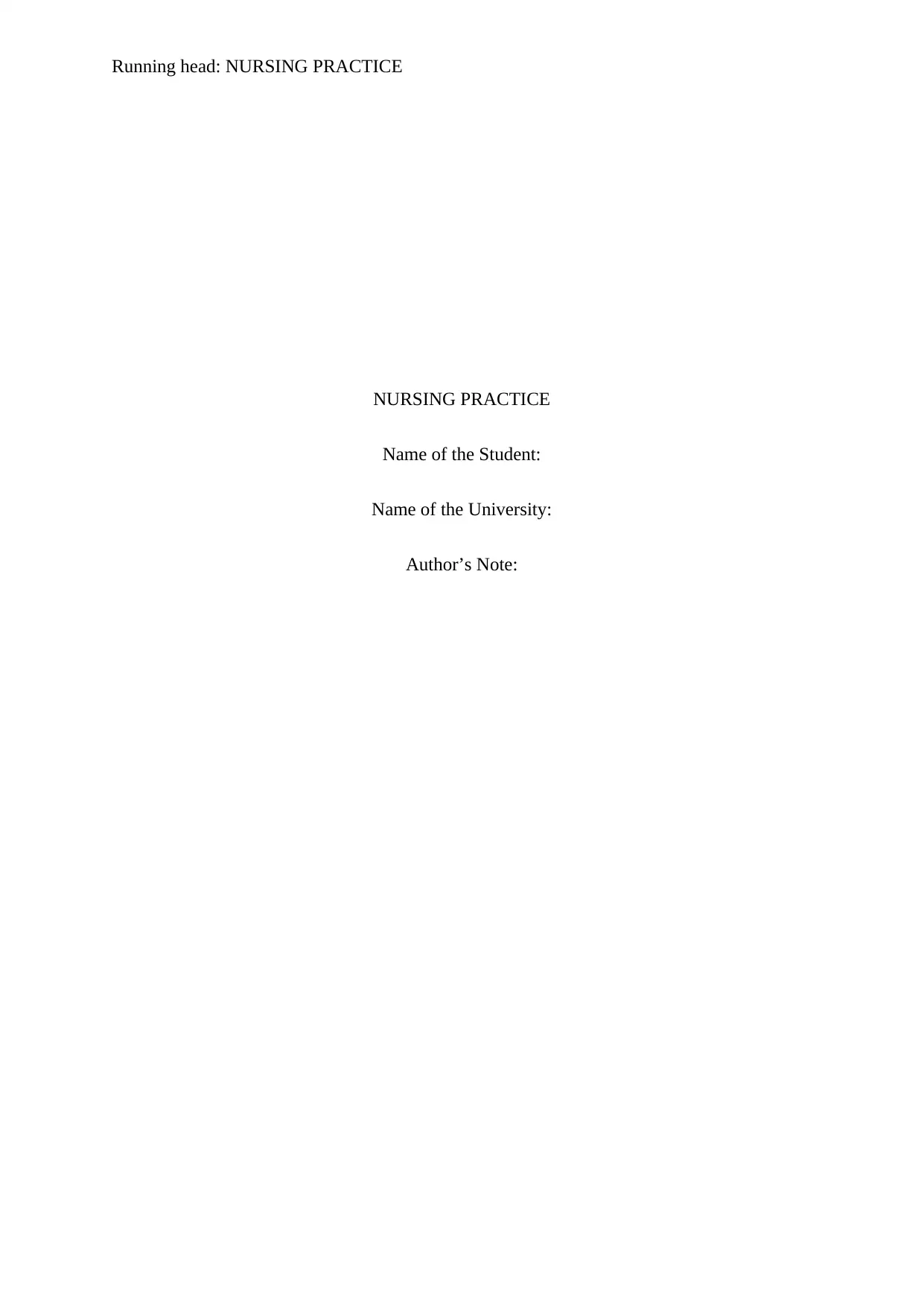
Running head: NURSING PRACTICE
NURSING PRACTICE
Name of the Student:
Name of the University:
Author’s Note:
NURSING PRACTICE
Name of the Student:
Name of the University:
Author’s Note:
Paraphrase This Document
Need a fresh take? Get an instant paraphrase of this document with our AI Paraphraser
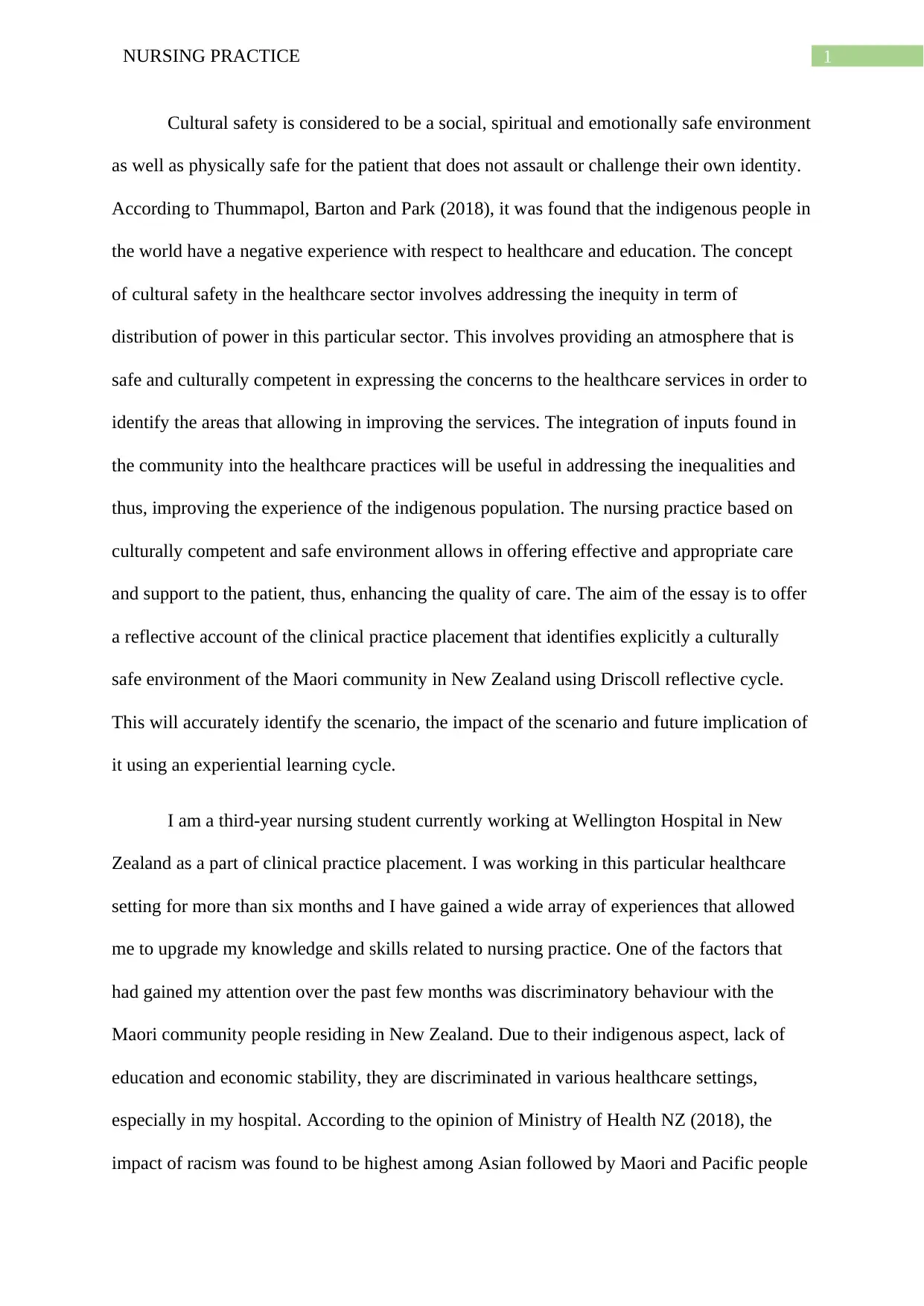
1NURSING PRACTICE
Cultural safety is considered to be a social, spiritual and emotionally safe environment
as well as physically safe for the patient that does not assault or challenge their own identity.
According to Thummapol, Barton and Park (2018), it was found that the indigenous people in
the world have a negative experience with respect to healthcare and education. The concept
of cultural safety in the healthcare sector involves addressing the inequity in term of
distribution of power in this particular sector. This involves providing an atmosphere that is
safe and culturally competent in expressing the concerns to the healthcare services in order to
identify the areas that allowing in improving the services. The integration of inputs found in
the community into the healthcare practices will be useful in addressing the inequalities and
thus, improving the experience of the indigenous population. The nursing practice based on
culturally competent and safe environment allows in offering effective and appropriate care
and support to the patient, thus, enhancing the quality of care. The aim of the essay is to offer
a reflective account of the clinical practice placement that identifies explicitly a culturally
safe environment of the Maori community in New Zealand using Driscoll reflective cycle.
This will accurately identify the scenario, the impact of the scenario and future implication of
it using an experiential learning cycle.
I am a third-year nursing student currently working at Wellington Hospital in New
Zealand as a part of clinical practice placement. I was working in this particular healthcare
setting for more than six months and I have gained a wide array of experiences that allowed
me to upgrade my knowledge and skills related to nursing practice. One of the factors that
had gained my attention over the past few months was discriminatory behaviour with the
Maori community people residing in New Zealand. Due to their indigenous aspect, lack of
education and economic stability, they are discriminated in various healthcare settings,
especially in my hospital. According to the opinion of Ministry of Health NZ (2018), the
impact of racism was found to be highest among Asian followed by Maori and Pacific people
Cultural safety is considered to be a social, spiritual and emotionally safe environment
as well as physically safe for the patient that does not assault or challenge their own identity.
According to Thummapol, Barton and Park (2018), it was found that the indigenous people in
the world have a negative experience with respect to healthcare and education. The concept
of cultural safety in the healthcare sector involves addressing the inequity in term of
distribution of power in this particular sector. This involves providing an atmosphere that is
safe and culturally competent in expressing the concerns to the healthcare services in order to
identify the areas that allowing in improving the services. The integration of inputs found in
the community into the healthcare practices will be useful in addressing the inequalities and
thus, improving the experience of the indigenous population. The nursing practice based on
culturally competent and safe environment allows in offering effective and appropriate care
and support to the patient, thus, enhancing the quality of care. The aim of the essay is to offer
a reflective account of the clinical practice placement that identifies explicitly a culturally
safe environment of the Maori community in New Zealand using Driscoll reflective cycle.
This will accurately identify the scenario, the impact of the scenario and future implication of
it using an experiential learning cycle.
I am a third-year nursing student currently working at Wellington Hospital in New
Zealand as a part of clinical practice placement. I was working in this particular healthcare
setting for more than six months and I have gained a wide array of experiences that allowed
me to upgrade my knowledge and skills related to nursing practice. One of the factors that
had gained my attention over the past few months was discriminatory behaviour with the
Maori community people residing in New Zealand. Due to their indigenous aspect, lack of
education and economic stability, they are discriminated in various healthcare settings,
especially in my hospital. According to the opinion of Ministry of Health NZ (2018), the
impact of racism was found to be highest among Asian followed by Maori and Pacific people
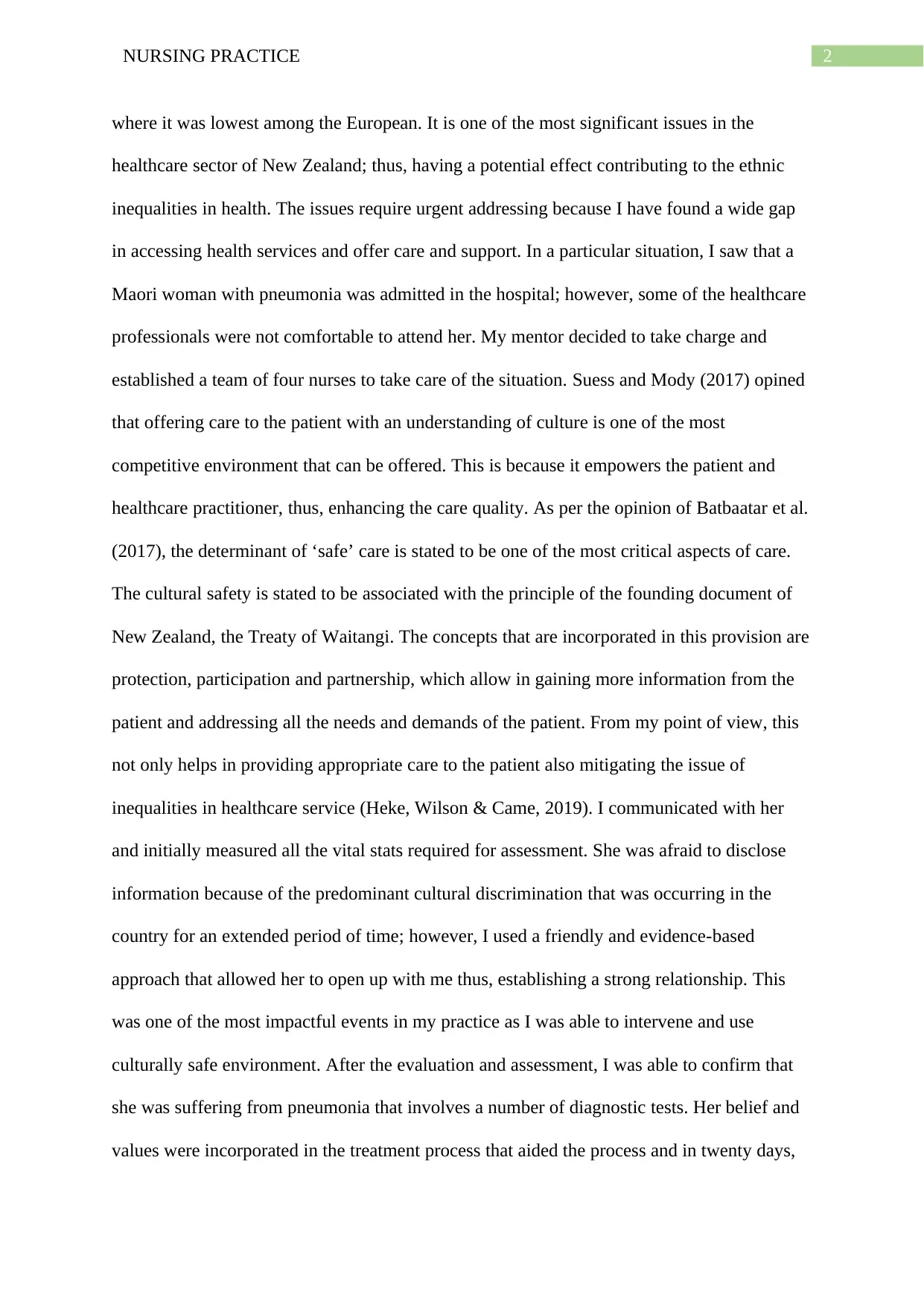
2NURSING PRACTICE
where it was lowest among the European. It is one of the most significant issues in the
healthcare sector of New Zealand; thus, having a potential effect contributing to the ethnic
inequalities in health. The issues require urgent addressing because I have found a wide gap
in accessing health services and offer care and support. In a particular situation, I saw that a
Maori woman with pneumonia was admitted in the hospital; however, some of the healthcare
professionals were not comfortable to attend her. My mentor decided to take charge and
established a team of four nurses to take care of the situation. Suess and Mody (2017) opined
that offering care to the patient with an understanding of culture is one of the most
competitive environment that can be offered. This is because it empowers the patient and
healthcare practitioner, thus, enhancing the care quality. As per the opinion of Batbaatar et al.
(2017), the determinant of ‘safe’ care is stated to be one of the most critical aspects of care.
The cultural safety is stated to be associated with the principle of the founding document of
New Zealand, the Treaty of Waitangi. The concepts that are incorporated in this provision are
protection, participation and partnership, which allow in gaining more information from the
patient and addressing all the needs and demands of the patient. From my point of view, this
not only helps in providing appropriate care to the patient also mitigating the issue of
inequalities in healthcare service (Heke, Wilson & Came, 2019). I communicated with her
and initially measured all the vital stats required for assessment. She was afraid to disclose
information because of the predominant cultural discrimination that was occurring in the
country for an extended period of time; however, I used a friendly and evidence-based
approach that allowed her to open up with me thus, establishing a strong relationship. This
was one of the most impactful events in my practice as I was able to intervene and use
culturally safe environment. After the evaluation and assessment, I was able to confirm that
she was suffering from pneumonia that involves a number of diagnostic tests. Her belief and
values were incorporated in the treatment process that aided the process and in twenty days,
where it was lowest among the European. It is one of the most significant issues in the
healthcare sector of New Zealand; thus, having a potential effect contributing to the ethnic
inequalities in health. The issues require urgent addressing because I have found a wide gap
in accessing health services and offer care and support. In a particular situation, I saw that a
Maori woman with pneumonia was admitted in the hospital; however, some of the healthcare
professionals were not comfortable to attend her. My mentor decided to take charge and
established a team of four nurses to take care of the situation. Suess and Mody (2017) opined
that offering care to the patient with an understanding of culture is one of the most
competitive environment that can be offered. This is because it empowers the patient and
healthcare practitioner, thus, enhancing the care quality. As per the opinion of Batbaatar et al.
(2017), the determinant of ‘safe’ care is stated to be one of the most critical aspects of care.
The cultural safety is stated to be associated with the principle of the founding document of
New Zealand, the Treaty of Waitangi. The concepts that are incorporated in this provision are
protection, participation and partnership, which allow in gaining more information from the
patient and addressing all the needs and demands of the patient. From my point of view, this
not only helps in providing appropriate care to the patient also mitigating the issue of
inequalities in healthcare service (Heke, Wilson & Came, 2019). I communicated with her
and initially measured all the vital stats required for assessment. She was afraid to disclose
information because of the predominant cultural discrimination that was occurring in the
country for an extended period of time; however, I used a friendly and evidence-based
approach that allowed her to open up with me thus, establishing a strong relationship. This
was one of the most impactful events in my practice as I was able to intervene and use
culturally safe environment. After the evaluation and assessment, I was able to confirm that
she was suffering from pneumonia that involves a number of diagnostic tests. Her belief and
values were incorporated in the treatment process that aided the process and in twenty days,
⊘ This is a preview!⊘
Do you want full access?
Subscribe today to unlock all pages.

Trusted by 1+ million students worldwide
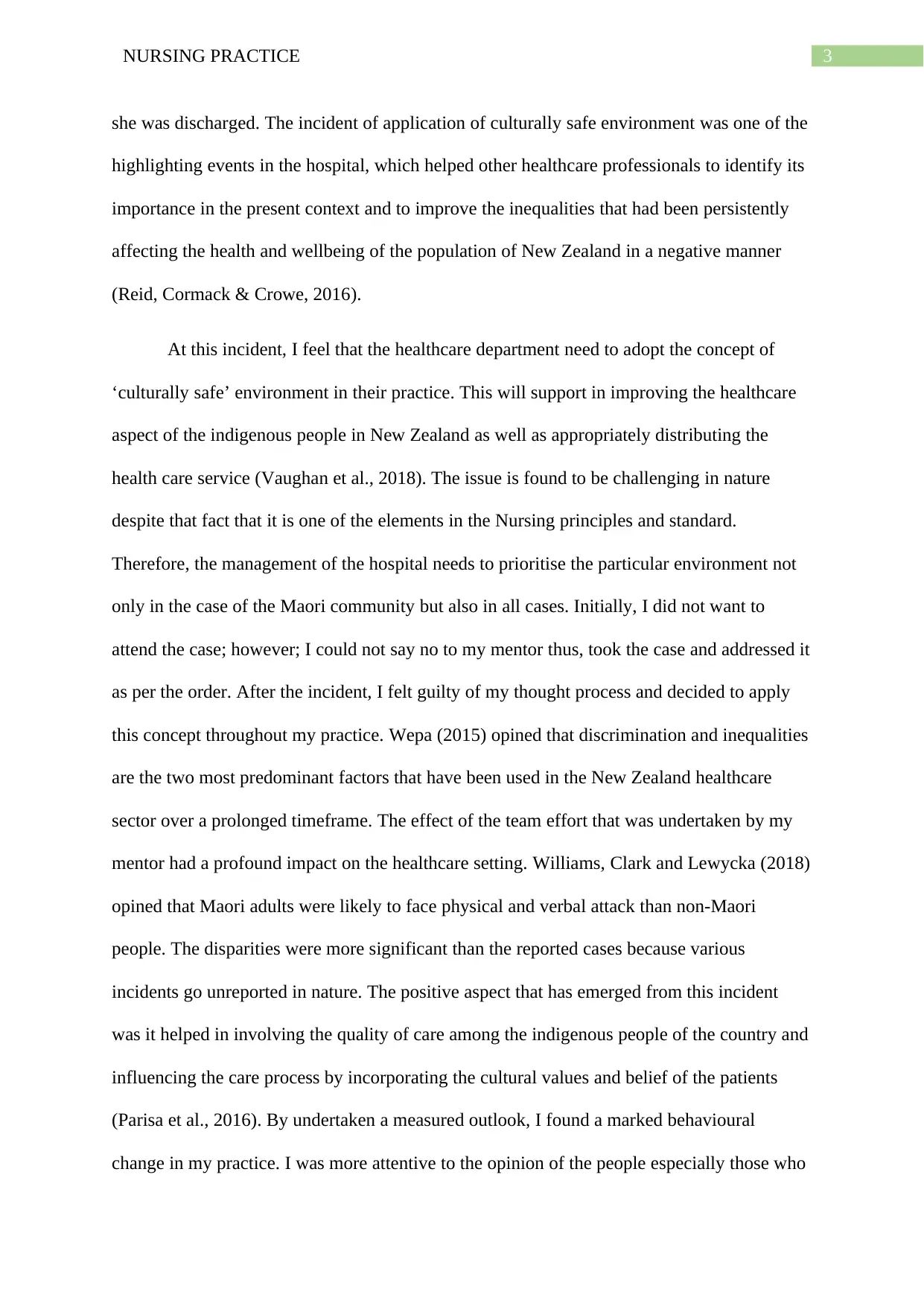
3NURSING PRACTICE
she was discharged. The incident of application of culturally safe environment was one of the
highlighting events in the hospital, which helped other healthcare professionals to identify its
importance in the present context and to improve the inequalities that had been persistently
affecting the health and wellbeing of the population of New Zealand in a negative manner
(Reid, Cormack & Crowe, 2016).
At this incident, I feel that the healthcare department need to adopt the concept of
‘culturally safe’ environment in their practice. This will support in improving the healthcare
aspect of the indigenous people in New Zealand as well as appropriately distributing the
health care service (Vaughan et al., 2018). The issue is found to be challenging in nature
despite that fact that it is one of the elements in the Nursing principles and standard.
Therefore, the management of the hospital needs to prioritise the particular environment not
only in the case of the Maori community but also in all cases. Initially, I did not want to
attend the case; however; I could not say no to my mentor thus, took the case and addressed it
as per the order. After the incident, I felt guilty of my thought process and decided to apply
this concept throughout my practice. Wepa (2015) opined that discrimination and inequalities
are the two most predominant factors that have been used in the New Zealand healthcare
sector over a prolonged timeframe. The effect of the team effort that was undertaken by my
mentor had a profound impact on the healthcare setting. Williams, Clark and Lewycka (2018)
opined that Maori adults were likely to face physical and verbal attack than non-Maori
people. The disparities were more significant than the reported cases because various
incidents go unreported in nature. The positive aspect that has emerged from this incident
was it helped in involving the quality of care among the indigenous people of the country and
influencing the care process by incorporating the cultural values and belief of the patients
(Parisa et al., 2016). By undertaken a measured outlook, I found a marked behavioural
change in my practice. I was more attentive to the opinion of the people especially those who
she was discharged. The incident of application of culturally safe environment was one of the
highlighting events in the hospital, which helped other healthcare professionals to identify its
importance in the present context and to improve the inequalities that had been persistently
affecting the health and wellbeing of the population of New Zealand in a negative manner
(Reid, Cormack & Crowe, 2016).
At this incident, I feel that the healthcare department need to adopt the concept of
‘culturally safe’ environment in their practice. This will support in improving the healthcare
aspect of the indigenous people in New Zealand as well as appropriately distributing the
health care service (Vaughan et al., 2018). The issue is found to be challenging in nature
despite that fact that it is one of the elements in the Nursing principles and standard.
Therefore, the management of the hospital needs to prioritise the particular environment not
only in the case of the Maori community but also in all cases. Initially, I did not want to
attend the case; however; I could not say no to my mentor thus, took the case and addressed it
as per the order. After the incident, I felt guilty of my thought process and decided to apply
this concept throughout my practice. Wepa (2015) opined that discrimination and inequalities
are the two most predominant factors that have been used in the New Zealand healthcare
sector over a prolonged timeframe. The effect of the team effort that was undertaken by my
mentor had a profound impact on the healthcare setting. Williams, Clark and Lewycka (2018)
opined that Maori adults were likely to face physical and verbal attack than non-Maori
people. The disparities were more significant than the reported cases because various
incidents go unreported in nature. The positive aspect that has emerged from this incident
was it helped in involving the quality of care among the indigenous people of the country and
influencing the care process by incorporating the cultural values and belief of the patients
(Parisa et al., 2016). By undertaken a measured outlook, I found a marked behavioural
change in my practice. I was more attentive to the opinion of the people especially those who
Paraphrase This Document
Need a fresh take? Get an instant paraphrase of this document with our AI Paraphraser
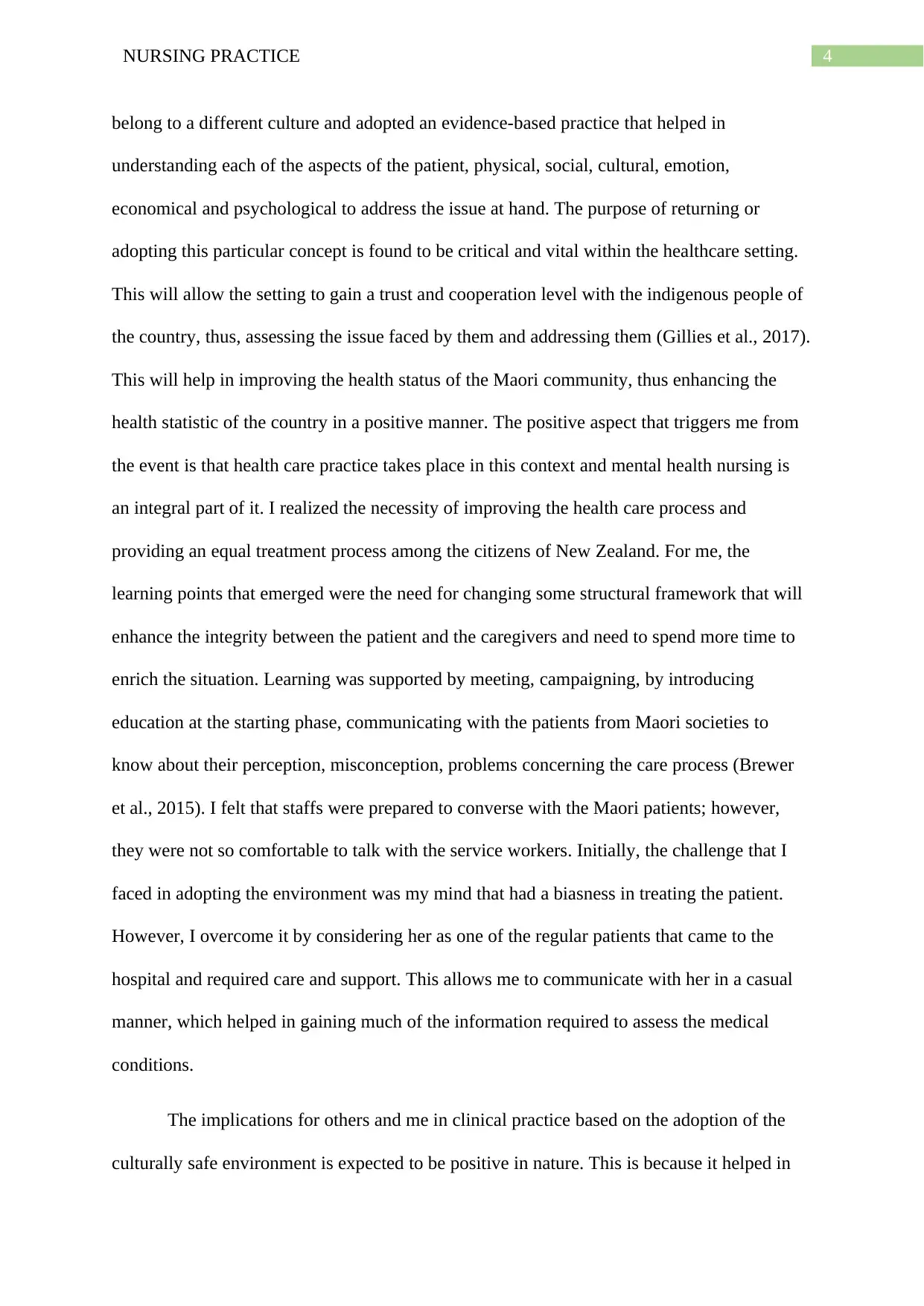
4NURSING PRACTICE
belong to a different culture and adopted an evidence-based practice that helped in
understanding each of the aspects of the patient, physical, social, cultural, emotion,
economical and psychological to address the issue at hand. The purpose of returning or
adopting this particular concept is found to be critical and vital within the healthcare setting.
This will allow the setting to gain a trust and cooperation level with the indigenous people of
the country, thus, assessing the issue faced by them and addressing them (Gillies et al., 2017).
This will help in improving the health status of the Maori community, thus enhancing the
health statistic of the country in a positive manner. The positive aspect that triggers me from
the event is that health care practice takes place in this context and mental health nursing is
an integral part of it. I realized the necessity of improving the health care process and
providing an equal treatment process among the citizens of New Zealand. For me, the
learning points that emerged were the need for changing some structural framework that will
enhance the integrity between the patient and the caregivers and need to spend more time to
enrich the situation. Learning was supported by meeting, campaigning, by introducing
education at the starting phase, communicating with the patients from Maori societies to
know about their perception, misconception, problems concerning the care process (Brewer
et al., 2015). I felt that staffs were prepared to converse with the Maori patients; however,
they were not so comfortable to talk with the service workers. Initially, the challenge that I
faced in adopting the environment was my mind that had a biasness in treating the patient.
However, I overcome it by considering her as one of the regular patients that came to the
hospital and required care and support. This allows me to communicate with her in a casual
manner, which helped in gaining much of the information required to assess the medical
conditions.
The implications for others and me in clinical practice based on the adoption of the
culturally safe environment is expected to be positive in nature. This is because it helped in
belong to a different culture and adopted an evidence-based practice that helped in
understanding each of the aspects of the patient, physical, social, cultural, emotion,
economical and psychological to address the issue at hand. The purpose of returning or
adopting this particular concept is found to be critical and vital within the healthcare setting.
This will allow the setting to gain a trust and cooperation level with the indigenous people of
the country, thus, assessing the issue faced by them and addressing them (Gillies et al., 2017).
This will help in improving the health status of the Maori community, thus enhancing the
health statistic of the country in a positive manner. The positive aspect that triggers me from
the event is that health care practice takes place in this context and mental health nursing is
an integral part of it. I realized the necessity of improving the health care process and
providing an equal treatment process among the citizens of New Zealand. For me, the
learning points that emerged were the need for changing some structural framework that will
enhance the integrity between the patient and the caregivers and need to spend more time to
enrich the situation. Learning was supported by meeting, campaigning, by introducing
education at the starting phase, communicating with the patients from Maori societies to
know about their perception, misconception, problems concerning the care process (Brewer
et al., 2015). I felt that staffs were prepared to converse with the Maori patients; however,
they were not so comfortable to talk with the service workers. Initially, the challenge that I
faced in adopting the environment was my mind that had a biasness in treating the patient.
However, I overcome it by considering her as one of the regular patients that came to the
hospital and required care and support. This allows me to communicate with her in a casual
manner, which helped in gaining much of the information required to assess the medical
conditions.
The implications for others and me in clinical practice based on the adoption of the
culturally safe environment is expected to be positive in nature. This is because it helped in
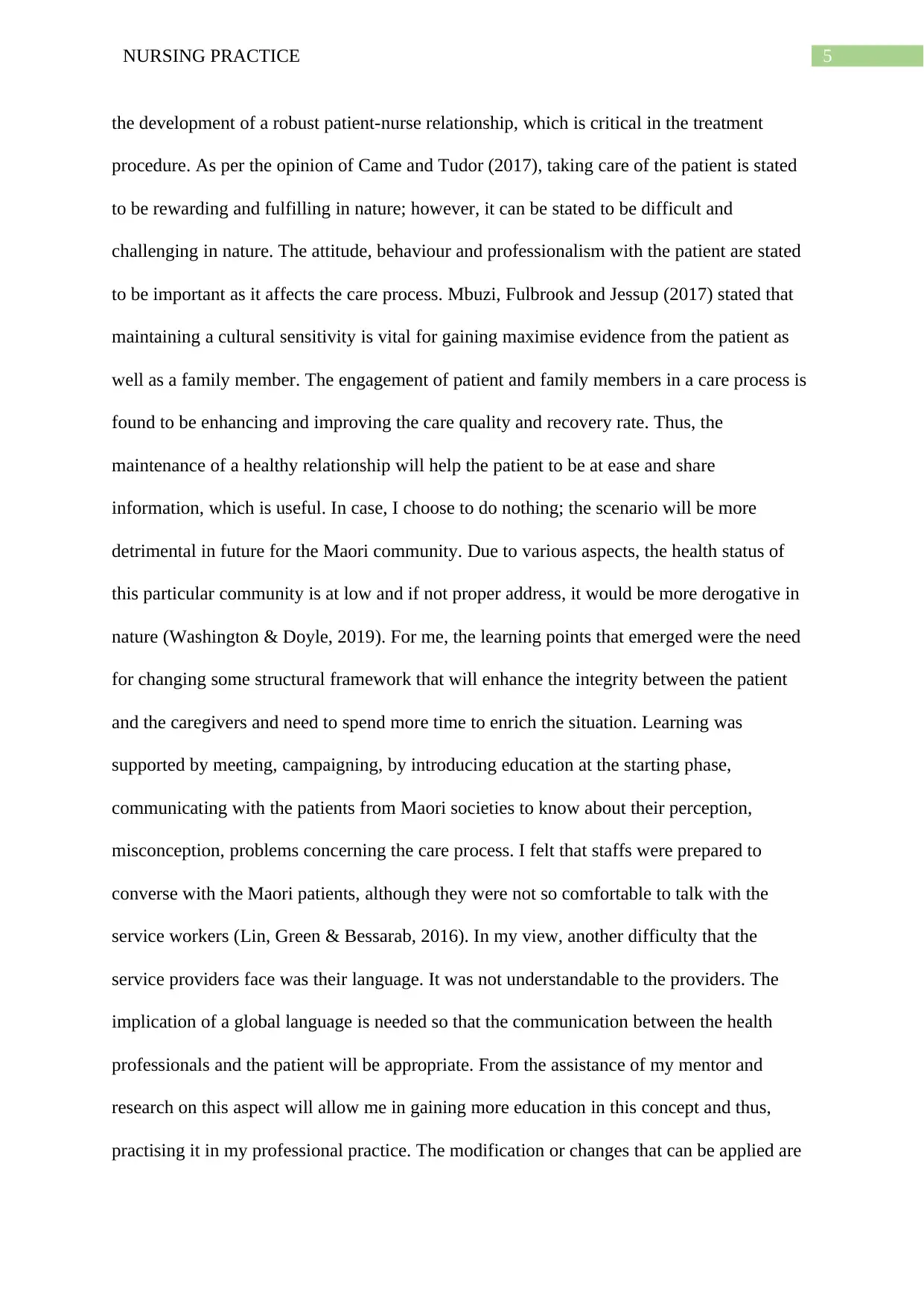
5NURSING PRACTICE
the development of a robust patient-nurse relationship, which is critical in the treatment
procedure. As per the opinion of Came and Tudor (2017), taking care of the patient is stated
to be rewarding and fulfilling in nature; however, it can be stated to be difficult and
challenging in nature. The attitude, behaviour and professionalism with the patient are stated
to be important as it affects the care process. Mbuzi, Fulbrook and Jessup (2017) stated that
maintaining a cultural sensitivity is vital for gaining maximise evidence from the patient as
well as a family member. The engagement of patient and family members in a care process is
found to be enhancing and improving the care quality and recovery rate. Thus, the
maintenance of a healthy relationship will help the patient to be at ease and share
information, which is useful. In case, I choose to do nothing; the scenario will be more
detrimental in future for the Maori community. Due to various aspects, the health status of
this particular community is at low and if not proper address, it would be more derogative in
nature (Washington & Doyle, 2019). For me, the learning points that emerged were the need
for changing some structural framework that will enhance the integrity between the patient
and the caregivers and need to spend more time to enrich the situation. Learning was
supported by meeting, campaigning, by introducing education at the starting phase,
communicating with the patients from Maori societies to know about their perception,
misconception, problems concerning the care process. I felt that staffs were prepared to
converse with the Maori patients, although they were not so comfortable to talk with the
service workers (Lin, Green & Bessarab, 2016). In my view, another difficulty that the
service providers face was their language. It was not understandable to the providers. The
implication of a global language is needed so that the communication between the health
professionals and the patient will be appropriate. From the assistance of my mentor and
research on this aspect will allow me in gaining more education in this concept and thus,
practising it in my professional practice. The modification or changes that can be applied are
the development of a robust patient-nurse relationship, which is critical in the treatment
procedure. As per the opinion of Came and Tudor (2017), taking care of the patient is stated
to be rewarding and fulfilling in nature; however, it can be stated to be difficult and
challenging in nature. The attitude, behaviour and professionalism with the patient are stated
to be important as it affects the care process. Mbuzi, Fulbrook and Jessup (2017) stated that
maintaining a cultural sensitivity is vital for gaining maximise evidence from the patient as
well as a family member. The engagement of patient and family members in a care process is
found to be enhancing and improving the care quality and recovery rate. Thus, the
maintenance of a healthy relationship will help the patient to be at ease and share
information, which is useful. In case, I choose to do nothing; the scenario will be more
detrimental in future for the Maori community. Due to various aspects, the health status of
this particular community is at low and if not proper address, it would be more derogative in
nature (Washington & Doyle, 2019). For me, the learning points that emerged were the need
for changing some structural framework that will enhance the integrity between the patient
and the caregivers and need to spend more time to enrich the situation. Learning was
supported by meeting, campaigning, by introducing education at the starting phase,
communicating with the patients from Maori societies to know about their perception,
misconception, problems concerning the care process. I felt that staffs were prepared to
converse with the Maori patients, although they were not so comfortable to talk with the
service workers (Lin, Green & Bessarab, 2016). In my view, another difficulty that the
service providers face was their language. It was not understandable to the providers. The
implication of a global language is needed so that the communication between the health
professionals and the patient will be appropriate. From the assistance of my mentor and
research on this aspect will allow me in gaining more education in this concept and thus,
practising it in my professional practice. The modification or changes that can be applied are
⊘ This is a preview!⊘
Do you want full access?
Subscribe today to unlock all pages.

Trusted by 1+ million students worldwide
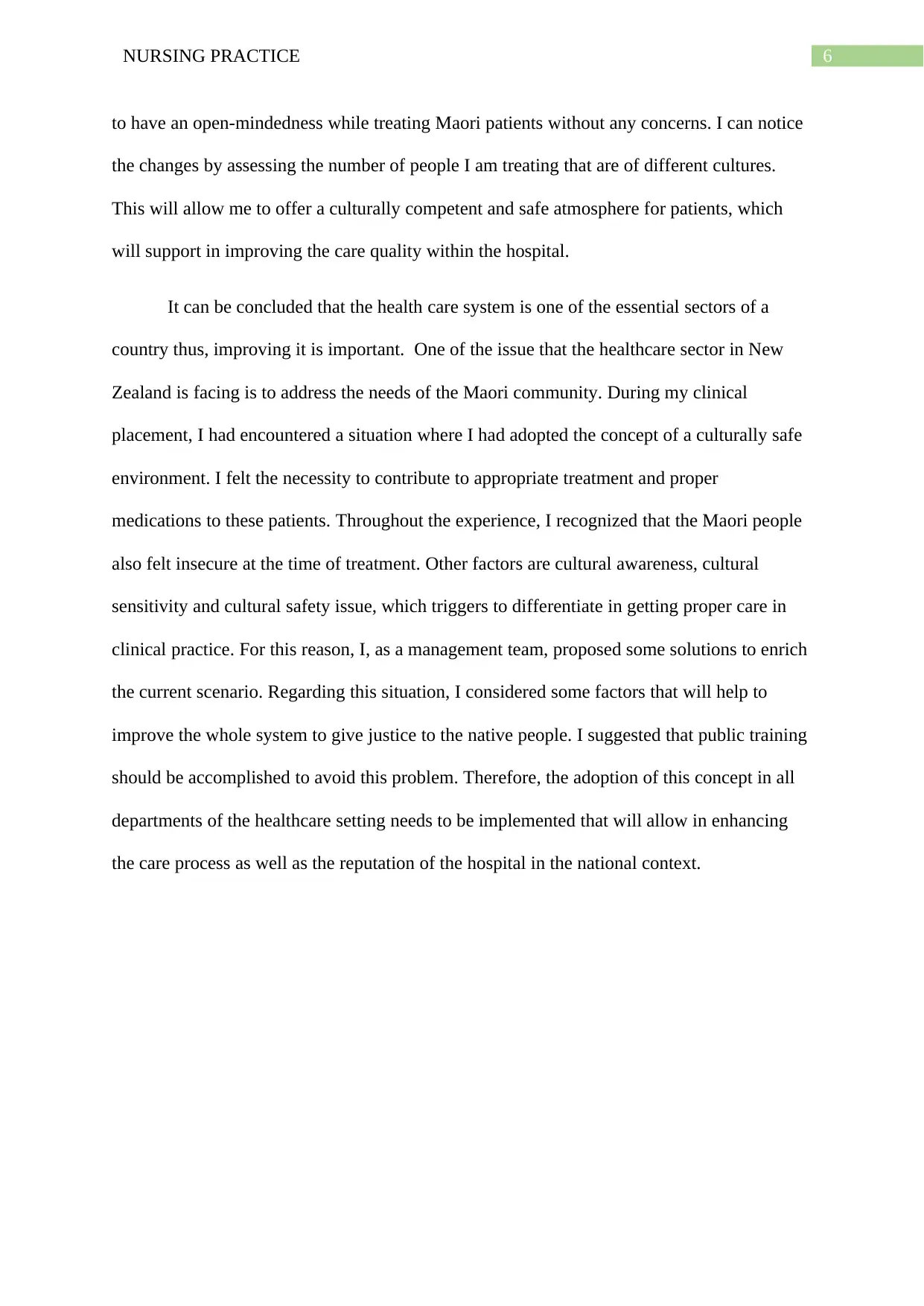
6NURSING PRACTICE
to have an open-mindedness while treating Maori patients without any concerns. I can notice
the changes by assessing the number of people I am treating that are of different cultures.
This will allow me to offer a culturally competent and safe atmosphere for patients, which
will support in improving the care quality within the hospital.
It can be concluded that the health care system is one of the essential sectors of a
country thus, improving it is important. One of the issue that the healthcare sector in New
Zealand is facing is to address the needs of the Maori community. During my clinical
placement, I had encountered a situation where I had adopted the concept of a culturally safe
environment. I felt the necessity to contribute to appropriate treatment and proper
medications to these patients. Throughout the experience, I recognized that the Maori people
also felt insecure at the time of treatment. Other factors are cultural awareness, cultural
sensitivity and cultural safety issue, which triggers to differentiate in getting proper care in
clinical practice. For this reason, I, as a management team, proposed some solutions to enrich
the current scenario. Regarding this situation, I considered some factors that will help to
improve the whole system to give justice to the native people. I suggested that public training
should be accomplished to avoid this problem. Therefore, the adoption of this concept in all
departments of the healthcare setting needs to be implemented that will allow in enhancing
the care process as well as the reputation of the hospital in the national context.
to have an open-mindedness while treating Maori patients without any concerns. I can notice
the changes by assessing the number of people I am treating that are of different cultures.
This will allow me to offer a culturally competent and safe atmosphere for patients, which
will support in improving the care quality within the hospital.
It can be concluded that the health care system is one of the essential sectors of a
country thus, improving it is important. One of the issue that the healthcare sector in New
Zealand is facing is to address the needs of the Maori community. During my clinical
placement, I had encountered a situation where I had adopted the concept of a culturally safe
environment. I felt the necessity to contribute to appropriate treatment and proper
medications to these patients. Throughout the experience, I recognized that the Maori people
also felt insecure at the time of treatment. Other factors are cultural awareness, cultural
sensitivity and cultural safety issue, which triggers to differentiate in getting proper care in
clinical practice. For this reason, I, as a management team, proposed some solutions to enrich
the current scenario. Regarding this situation, I considered some factors that will help to
improve the whole system to give justice to the native people. I suggested that public training
should be accomplished to avoid this problem. Therefore, the adoption of this concept in all
departments of the healthcare setting needs to be implemented that will allow in enhancing
the care process as well as the reputation of the hospital in the national context.
Paraphrase This Document
Need a fresh take? Get an instant paraphrase of this document with our AI Paraphraser
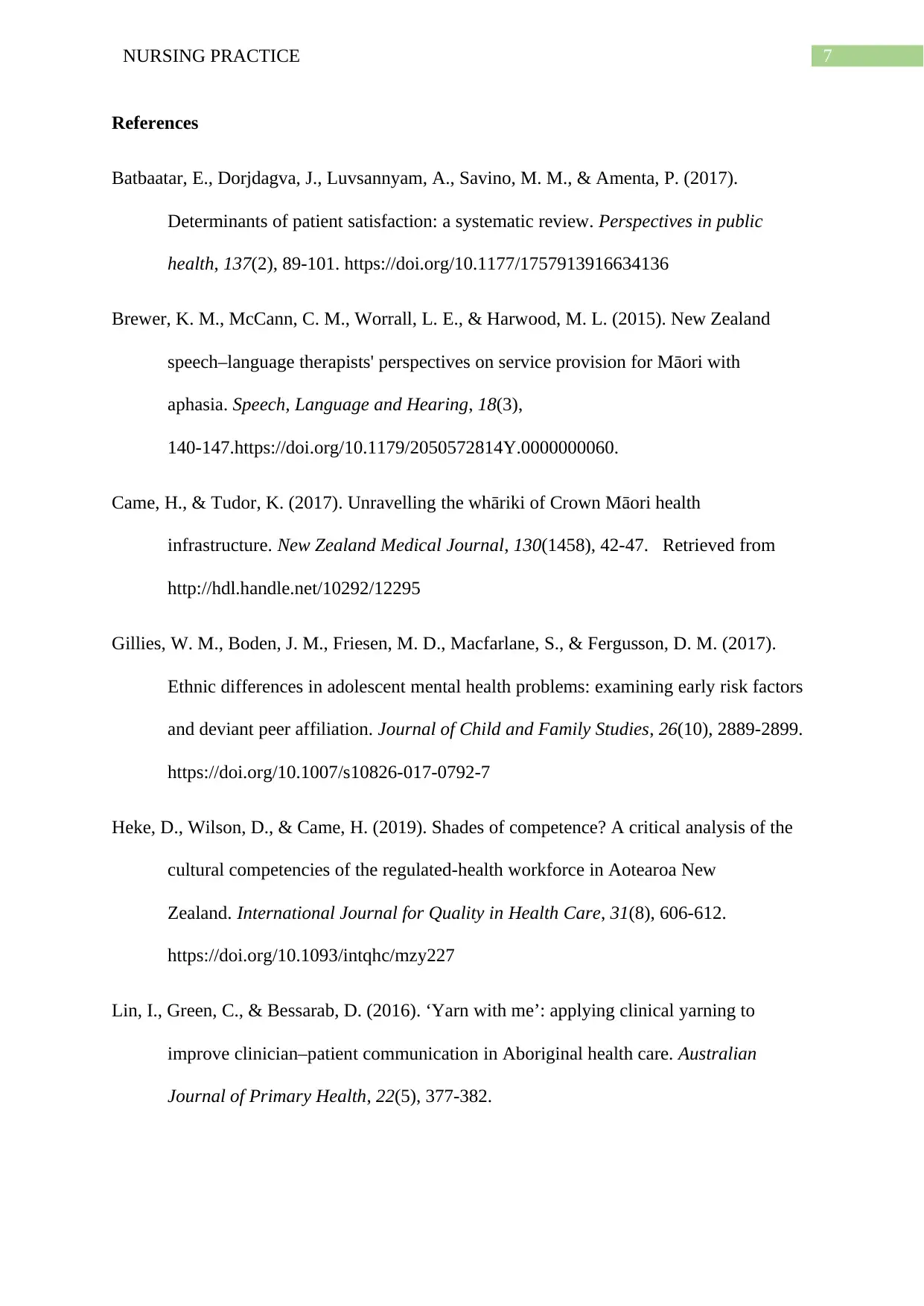
7NURSING PRACTICE
References
Batbaatar, E., Dorjdagva, J., Luvsannyam, A., Savino, M. M., & Amenta, P. (2017).
Determinants of patient satisfaction: a systematic review. Perspectives in public
health, 137(2), 89-101. https://doi.org/10.1177/1757913916634136
Brewer, K. M., McCann, C. M., Worrall, L. E., & Harwood, M. L. (2015). New Zealand
speech–language therapists' perspectives on service provision for Māori with
aphasia. Speech, Language and Hearing, 18(3),
140-147.https://doi.org/10.1179/2050572814Y.0000000060.
Came, H., & Tudor, K. (2017). Unravelling the whāriki of Crown Māori health
infrastructure. New Zealand Medical Journal, 130(1458), 42-47. Retrieved from
http://hdl.handle.net/10292/12295
Gillies, W. M., Boden, J. M., Friesen, M. D., Macfarlane, S., & Fergusson, D. M. (2017).
Ethnic differences in adolescent mental health problems: examining early risk factors
and deviant peer affiliation. Journal of Child and Family Studies, 26(10), 2889-2899.
https://doi.org/10.1007/s10826-017-0792-7
Heke, D., Wilson, D., & Came, H. (2019). Shades of competence? A critical analysis of the
cultural competencies of the regulated-health workforce in Aotearoa New
Zealand. International Journal for Quality in Health Care, 31(8), 606-612.
https://doi.org/10.1093/intqhc/mzy227
Lin, I., Green, C., & Bessarab, D. (2016). ‘Yarn with me’: applying clinical yarning to
improve clinician–patient communication in Aboriginal health care. Australian
Journal of Primary Health, 22(5), 377-382.
References
Batbaatar, E., Dorjdagva, J., Luvsannyam, A., Savino, M. M., & Amenta, P. (2017).
Determinants of patient satisfaction: a systematic review. Perspectives in public
health, 137(2), 89-101. https://doi.org/10.1177/1757913916634136
Brewer, K. M., McCann, C. M., Worrall, L. E., & Harwood, M. L. (2015). New Zealand
speech–language therapists' perspectives on service provision for Māori with
aphasia. Speech, Language and Hearing, 18(3),
140-147.https://doi.org/10.1179/2050572814Y.0000000060.
Came, H., & Tudor, K. (2017). Unravelling the whāriki of Crown Māori health
infrastructure. New Zealand Medical Journal, 130(1458), 42-47. Retrieved from
http://hdl.handle.net/10292/12295
Gillies, W. M., Boden, J. M., Friesen, M. D., Macfarlane, S., & Fergusson, D. M. (2017).
Ethnic differences in adolescent mental health problems: examining early risk factors
and deviant peer affiliation. Journal of Child and Family Studies, 26(10), 2889-2899.
https://doi.org/10.1007/s10826-017-0792-7
Heke, D., Wilson, D., & Came, H. (2019). Shades of competence? A critical analysis of the
cultural competencies of the regulated-health workforce in Aotearoa New
Zealand. International Journal for Quality in Health Care, 31(8), 606-612.
https://doi.org/10.1093/intqhc/mzy227
Lin, I., Green, C., & Bessarab, D. (2016). ‘Yarn with me’: applying clinical yarning to
improve clinician–patient communication in Aboriginal health care. Australian
Journal of Primary Health, 22(5), 377-382.
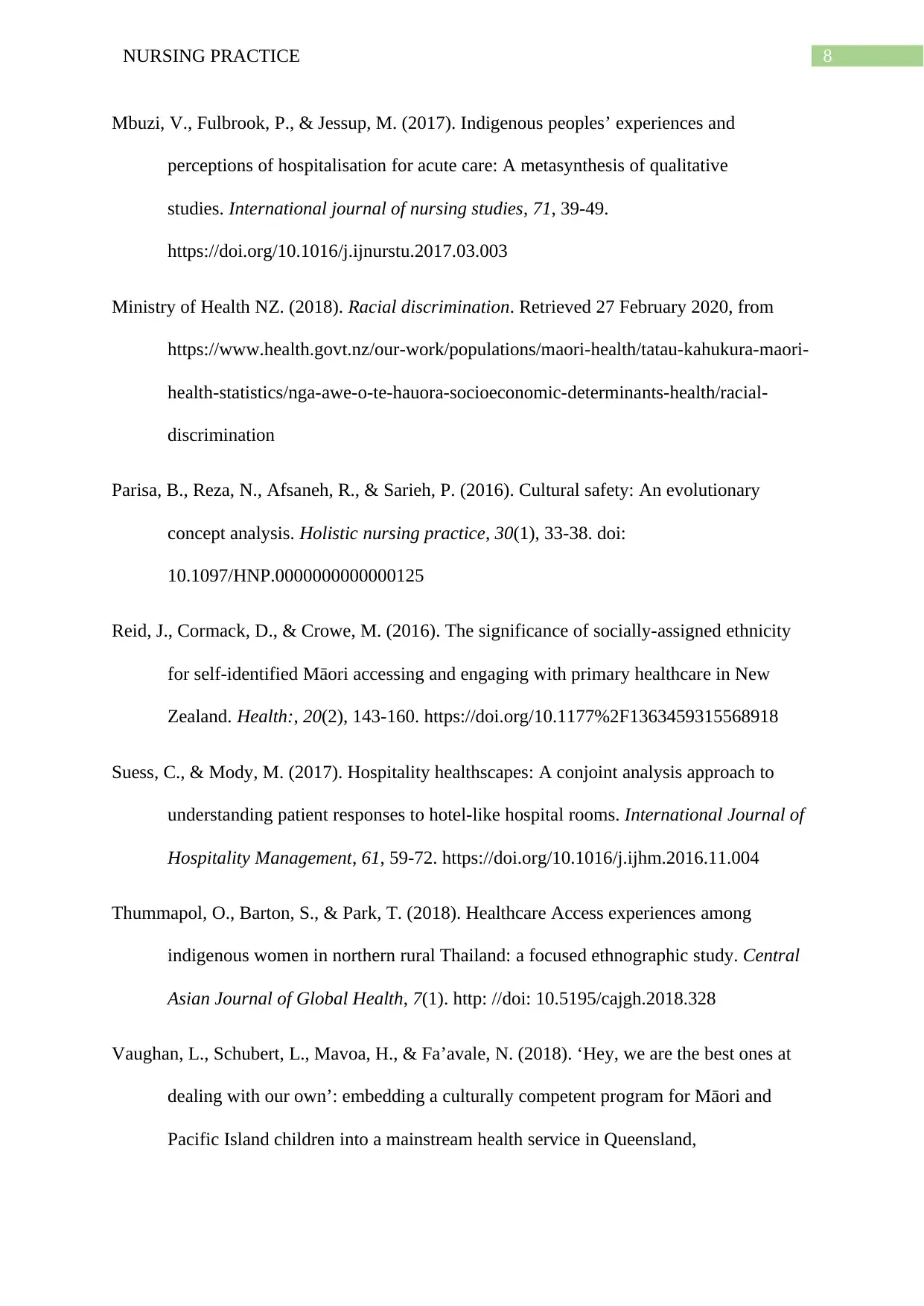
8NURSING PRACTICE
Mbuzi, V., Fulbrook, P., & Jessup, M. (2017). Indigenous peoples’ experiences and
perceptions of hospitalisation for acute care: A metasynthesis of qualitative
studies. International journal of nursing studies, 71, 39-49.
https://doi.org/10.1016/j.ijnurstu.2017.03.003
Ministry of Health NZ. (2018). Racial discrimination. Retrieved 27 February 2020, from
https://www.health.govt.nz/our-work/populations/maori-health/tatau-kahukura-maori-
health-statistics/nga-awe-o-te-hauora-socioeconomic-determinants-health/racial-
discrimination
Parisa, B., Reza, N., Afsaneh, R., & Sarieh, P. (2016). Cultural safety: An evolutionary
concept analysis. Holistic nursing practice, 30(1), 33-38. doi:
10.1097/HNP.0000000000000125
Reid, J., Cormack, D., & Crowe, M. (2016). The significance of socially-assigned ethnicity
for self-identified Māori accessing and engaging with primary healthcare in New
Zealand. Health:, 20(2), 143-160. https://doi.org/10.1177%2F1363459315568918
Suess, C., & Mody, M. (2017). Hospitality healthscapes: A conjoint analysis approach to
understanding patient responses to hotel-like hospital rooms. International Journal of
Hospitality Management, 61, 59-72. https://doi.org/10.1016/j.ijhm.2016.11.004
Thummapol, O., Barton, S., & Park, T. (2018). Healthcare Access experiences among
indigenous women in northern rural Thailand: a focused ethnographic study. Central
Asian Journal of Global Health, 7(1). http: //doi: 10.5195/cajgh.2018.328
Vaughan, L., Schubert, L., Mavoa, H., & Fa’avale, N. (2018). ‘Hey, we are the best ones at
dealing with our own’: embedding a culturally competent program for Māori and
Pacific Island children into a mainstream health service in Queensland,
Mbuzi, V., Fulbrook, P., & Jessup, M. (2017). Indigenous peoples’ experiences and
perceptions of hospitalisation for acute care: A metasynthesis of qualitative
studies. International journal of nursing studies, 71, 39-49.
https://doi.org/10.1016/j.ijnurstu.2017.03.003
Ministry of Health NZ. (2018). Racial discrimination. Retrieved 27 February 2020, from
https://www.health.govt.nz/our-work/populations/maori-health/tatau-kahukura-maori-
health-statistics/nga-awe-o-te-hauora-socioeconomic-determinants-health/racial-
discrimination
Parisa, B., Reza, N., Afsaneh, R., & Sarieh, P. (2016). Cultural safety: An evolutionary
concept analysis. Holistic nursing practice, 30(1), 33-38. doi:
10.1097/HNP.0000000000000125
Reid, J., Cormack, D., & Crowe, M. (2016). The significance of socially-assigned ethnicity
for self-identified Māori accessing and engaging with primary healthcare in New
Zealand. Health:, 20(2), 143-160. https://doi.org/10.1177%2F1363459315568918
Suess, C., & Mody, M. (2017). Hospitality healthscapes: A conjoint analysis approach to
understanding patient responses to hotel-like hospital rooms. International Journal of
Hospitality Management, 61, 59-72. https://doi.org/10.1016/j.ijhm.2016.11.004
Thummapol, O., Barton, S., & Park, T. (2018). Healthcare Access experiences among
indigenous women in northern rural Thailand: a focused ethnographic study. Central
Asian Journal of Global Health, 7(1). http: //doi: 10.5195/cajgh.2018.328
Vaughan, L., Schubert, L., Mavoa, H., & Fa’avale, N. (2018). ‘Hey, we are the best ones at
dealing with our own’: embedding a culturally competent program for Māori and
Pacific Island children into a mainstream health service in Queensland,
⊘ This is a preview!⊘
Do you want full access?
Subscribe today to unlock all pages.

Trusted by 1+ million students worldwide
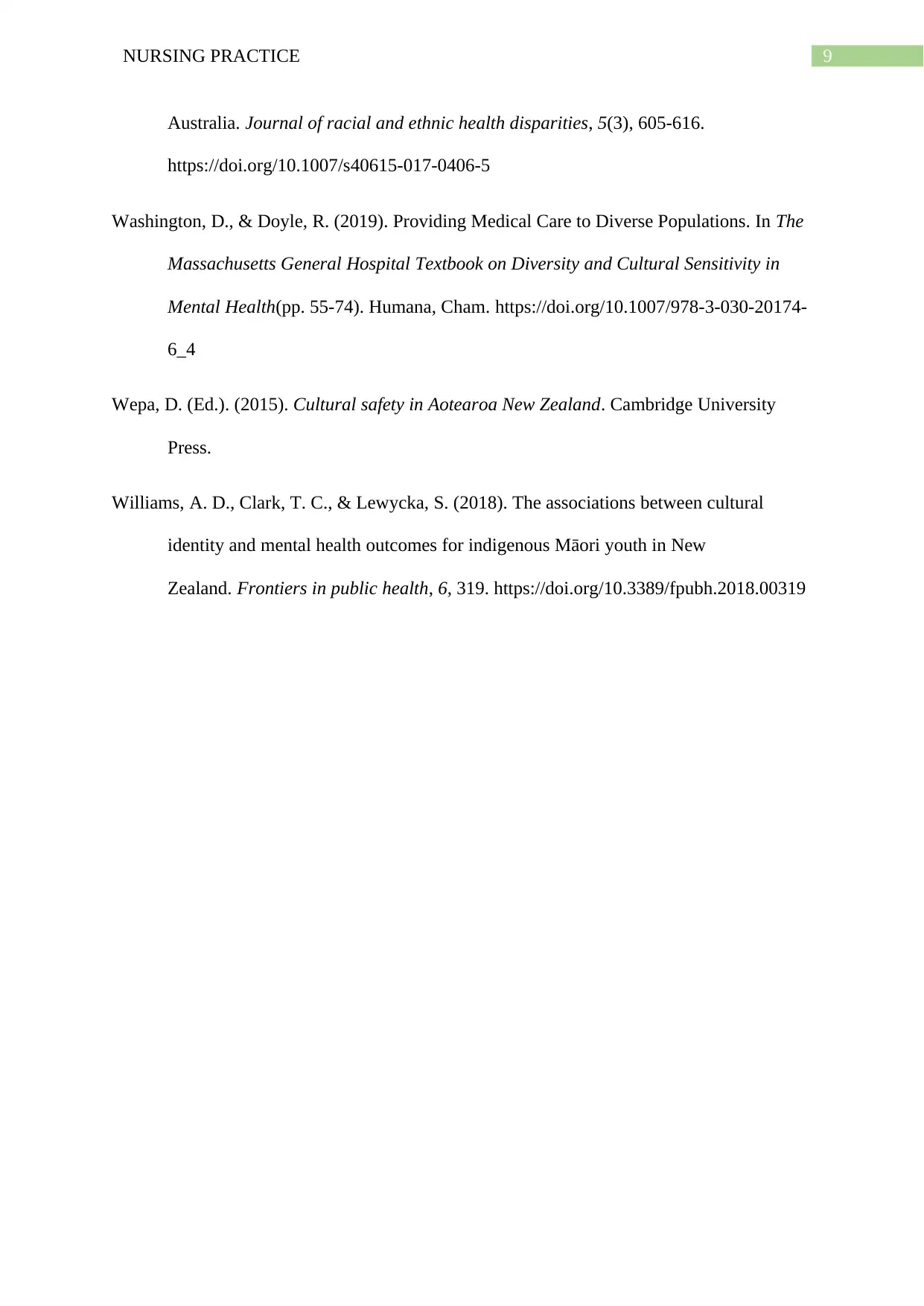
9NURSING PRACTICE
Australia. Journal of racial and ethnic health disparities, 5(3), 605-616.
https://doi.org/10.1007/s40615-017-0406-5
Washington, D., & Doyle, R. (2019). Providing Medical Care to Diverse Populations. In The
Massachusetts General Hospital Textbook on Diversity and Cultural Sensitivity in
Mental Health(pp. 55-74). Humana, Cham. https://doi.org/10.1007/978-3-030-20174-
6_4
Wepa, D. (Ed.). (2015). Cultural safety in Aotearoa New Zealand. Cambridge University
Press.
Williams, A. D., Clark, T. C., & Lewycka, S. (2018). The associations between cultural
identity and mental health outcomes for indigenous Māori youth in New
Zealand. Frontiers in public health, 6, 319. https://doi.org/10.3389/fpubh.2018.00319
Australia. Journal of racial and ethnic health disparities, 5(3), 605-616.
https://doi.org/10.1007/s40615-017-0406-5
Washington, D., & Doyle, R. (2019). Providing Medical Care to Diverse Populations. In The
Massachusetts General Hospital Textbook on Diversity and Cultural Sensitivity in
Mental Health(pp. 55-74). Humana, Cham. https://doi.org/10.1007/978-3-030-20174-
6_4
Wepa, D. (Ed.). (2015). Cultural safety in Aotearoa New Zealand. Cambridge University
Press.
Williams, A. D., Clark, T. C., & Lewycka, S. (2018). The associations between cultural
identity and mental health outcomes for indigenous Māori youth in New
Zealand. Frontiers in public health, 6, 319. https://doi.org/10.3389/fpubh.2018.00319
1 out of 10
Related Documents
Your All-in-One AI-Powered Toolkit for Academic Success.
+13062052269
info@desklib.com
Available 24*7 on WhatsApp / Email
![[object Object]](/_next/static/media/star-bottom.7253800d.svg)
Unlock your academic potential
Copyright © 2020–2026 A2Z Services. All Rights Reserved. Developed and managed by ZUCOL.




